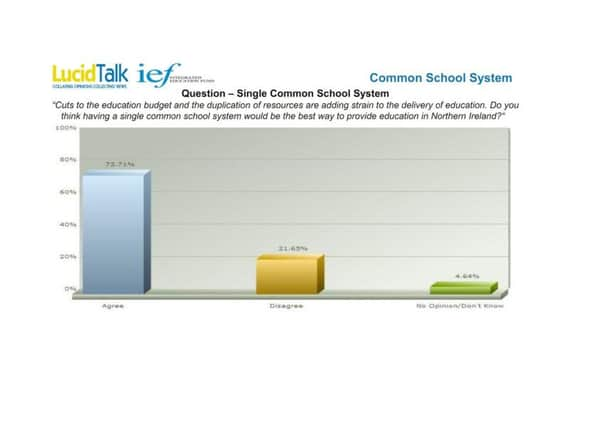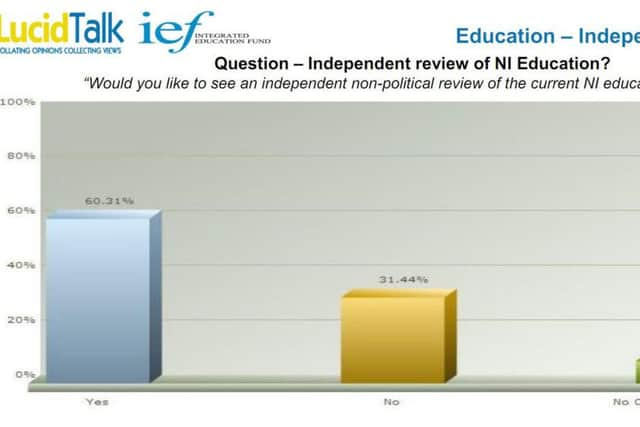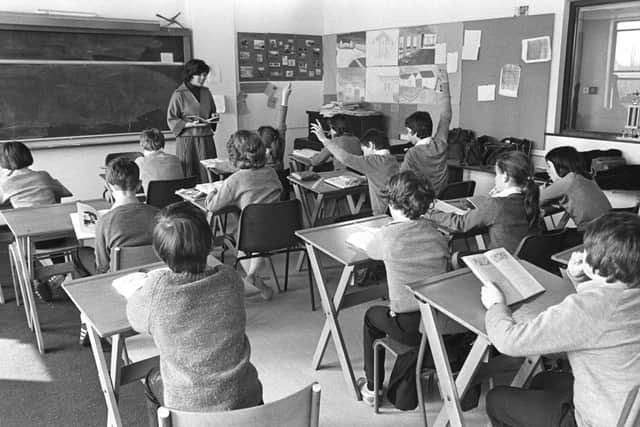Integrated education: NI public wants single school system, poll finds


That is according to the Integrated Education Fund (IEF), after it released the results of the latest poll on the subject of bringing all Northern Irish children together into a single school system.
The survey was commissioned by the IEF, and among the results were that almost three-questers of respondents agreed with the idea of creating a single, unified education system (see question, image above).
Advertisement
Hide AdAdvertisement
Hide AdIEF spokesman Sam Fitzsimmons said that the results are in keeping with polls dating back to the 1970s, and said he hoped it will spur politicians to act on it.


When the News Letter asked all five main parties their views, many were supportive of the idea of integrated education.
However the nationalist parties both cited the importance of letting parents choose whether to send children to a largely-Protestant “controlled” school, or a Catholic-dominated “maintained” one.
The poll by LucidTalk surveyed 1,094 people (46 per cent Protestant, 37 per cent Catholic, and the rest “other” or “no religion”).
Advertisement
Hide AdAdvertisement
Hide AdIn a section marked “long term vision”, respondents were asked how important “educating children of all communities within one common school system” was (it did not specifically mention integrated education).


Of those who were Protestant or came from a Protestant background, 63.3 per cent rated the idea of as being “very important”. Another 19 per cent said it was “important”.
This means a grand total of 82.3 per cent of Protestants believed it to be either “important” or “very important”.
Among those listed as “Catholic”, 69.6 per cent considered the issue of common schooling to be “very important”.
Advertisement
Hide AdAdvertisement
Hide AdOn top of the 69.6 per cent, another 13 per cent said creating a common school system was “important”.


This means that a grand total of 82.6 per cent of Catholics think the issue is either “very important” or just “important”.
Asked how the outcome of this poll compares to previous surveys, Mr Fitzsimmons said: “Polls in the past that we commissioned, and other independent polls, have asked direct questions about integrated education, [and] have successively had fairly strong support – the figures are something in the region of between 69 and 80 per cent. That’s pretty consistent.”
Only about seven per cent of pupils are currently educated in an integrated school.
Advertisement
Hide AdAdvertisement
Hide AdMaintained schools are overwhelmingly dominated by Catholics, and in controlled schools the number of Catholics is only 7.3 per cent at primary level, and 5.4 in post-primary.


Asked the reasons for the status quo, Mr Fitzsimmons said it dates back to the founding of the state.
“Lord Londonderry was the first education minister on the new Northern Ireland government,” he said.
“What he wanted to establish was a single, non-denominational education system. The five main churches – the Catholic church and Protestant churches – were completely against that. Lord Londonderry had to drop the policy. Since then, we’ve had the system we have today.”
Advertisement
Hide AdAdvertisement
Hide AdHe added that while the Council for Catholic Maintained Schools (CCMS) can demonstrate the need for a new Catholic school in a certain area by totting up baptismal records, and the Education Authority can plan controlled schools, there is no similar planning body for integrated schools.
Such schools are not set up automatically by the government, but via lobbying from parents – and most existing ones are over-subscribed.
Whilst waiting to prove their funding case to the Department of Education, the IEF helps support such new schools.
Many political parties have touted the virtues of “shared education” – which basically means controlled or Catholic schools sharing some resources with each other – though Mr Fitzsimmons said this merely “maintains the status quo”.
Advertisement
Hide AdAdvertisement
Hide AdAs for the current Shared Education Bill – mentioned by Sinn Fein (see accompanying story) – it offers “nothing new”, he said, and only means that departments would be obliged to promote shared education.
Ultimately he said there remains a lack of “political will and leadership to respond to what the polling has been saying consistently over the last number of decades”.
Asked its reaction to the survey, the CCMS said: “Catholic schools exist to meet the wishes of parents that want to send their child to a Catholic school. CCMS schools welcome pupils from all backgrounds and actively promote diversity and inclusivity within the classroom.”
The Department of Education itself said the growth of integrated schools has slowed since 2000, and it has commissioned “an independent review to examine how best to plan, grow and develop integrated education in the 21st century”. This will report later in 2016.
Advertisement
Hide AdAdvertisement
Hide AdWhat actually is integration?
The first integrated school in the Province was Lagan College on the southern edge of Belfast. It opened in 1981.
The IEF said integrated schools must sign up to a statement of principles drawn up by the Northern Ireland Council for Integrated Education, committing them to striving towards the idea of having 40 per cent of its pupils from a Catholic background, 40 per cent from a Protestant background, and the remainder from other religious or no religious background.
Advertisement
Hide AdAdvertisement
Hide AdMeanwhile, the Department for Education also has its own policy. Since the 1990s, it has been the case that a newly-built integrated school must attract 30 per cent of its pupils from the minority Protestant or Catholic community in the area where it is based.
For example, if a school were to open on the Falls Road, it would have to attract 30 per cent Protestants.
If a school which was already up-and-running is later transformed into an integrated one, it must attract 10 per cent of such minority students in its first year, rising to 30 per cent later.
• Polling was carried out by LucidTalk, between October 19 2015 and November 20. A demographically representative sample of 1,094 NI residents, aged 18+, were interviewed. Results are weighted to match the NI demographics. The project used poll questions agreed with the Integrated Education Fund (IEF).
Advertisement
Hide AdAdvertisement
Hide AdAll poll questions were agreed to British Polling Council (BPC) standards to ensure neutrality and balance. Results are accurate to a margin of error of +/-2.6%, at 95% confidence. LucidTalk is a member of all recognised professional polling and market research organisations, including the UK Market Research Society (UK-MRS) and British Polling Council (BPC).